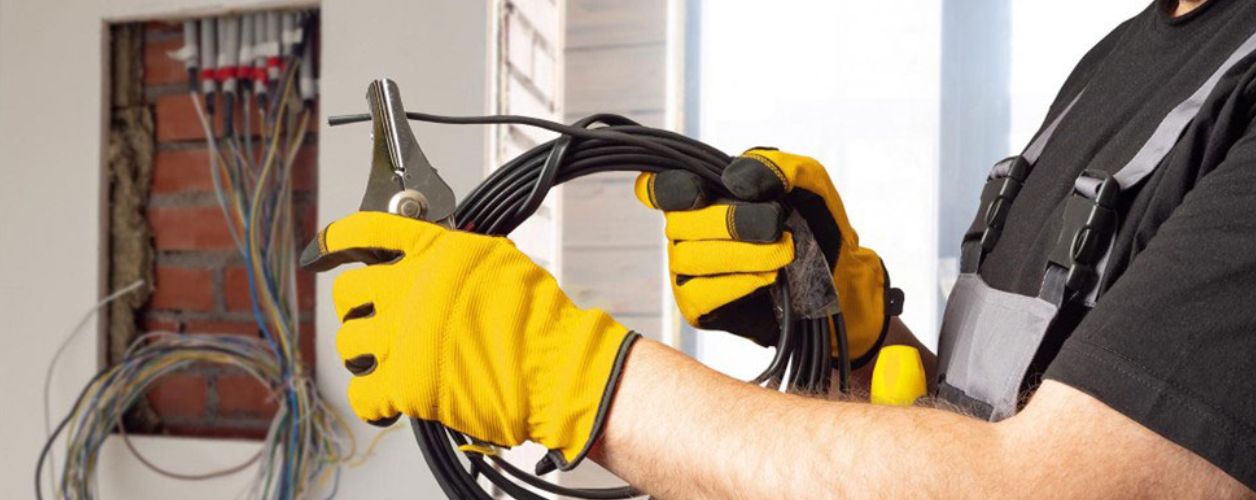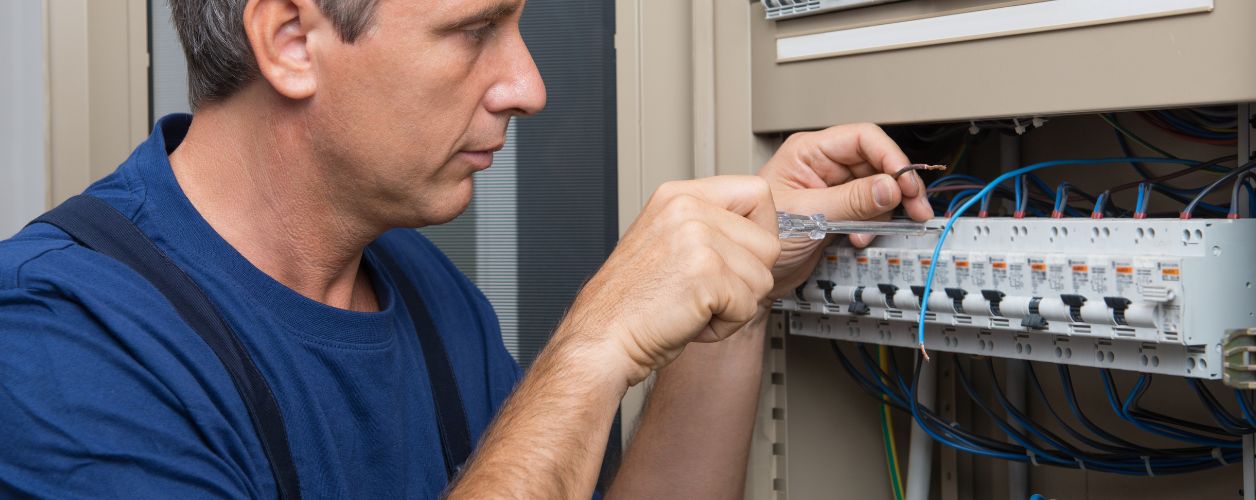Get free quotes within minutes
How Often Should You Rewire Your Home?

Table Of Contents
- Introduction
- Importance of Rewiring Your Home
- How Long Should You Wait?
- What Determines The Frequency Of Rewiring?
- What Are the Signs That Rewiring Is Needed?
- How Long Does Wiring Last?
- How Long Do Electrical Panels Last?
- What Are the Dangers of Old Wiring?
- Is Rewiring Worth It?
- What to Consider When Rewiring
- Final Thoughts
How Often Should You Rewire Your Home? House Rewiring Signs Explained
The burning question for most homeowners is how often their homes need rewiring. Here, this issue is taken quite seriously. Not just for safety reasons. This rewiring also maximizes the efficiency, usability, and market value of your house. Investing in rewiring now can save you thousands in future repairs and insurance costs.
A home should ideally be rewired every 25 to 40 years to ensure safety and optimal functionality. However, the need for rewiring can vary depending on the age of the home, the type of wiring, and any renovations that may have been made to the electrical system. If full rewiring isn't feasible, partial upgrades or adding dedicated circuits for high-demand appliances may be considered. Let's look into why rewiring your home is so important, its timing, and what to look for.
Importance of Rewiring Your Home
- Rewiring renders your home safe. Wires age with time. They get overheated or spark. That can cause fires. Having them replaced with newer wiring eliminates that risk.
- Rewiring also safeguards your appliances. New wiring can carry more power. That prevents damage to your electronics and appliances.
- It also adds value to your home. Buyers like homes with safe and modern systems. A new electrical system provides peace of mind. It indicates that the house is well-maintained and future-ready.
- It makes room for bespoke upgrades. As you rewire, you have space to include additional outlets. You can install smart technology such as lights, security systems, or EV chargers.
- New wiring also lowers your energy bills. Older systems waste energy. Modern wiring is more efficient. That reduces your electricity usage and costs.
- Finally, new fixtures and fittings require new wiring. You can put in fashionable switches, dimmers, and lights. Makes your house more useful and desirable.
How Long Should You Wait?
Most professionals say that 25 to 30 years is a good time frame for rewiring. Some systems may go longer; some may go shorter. This depends on the wiring material, the system utilization, and potential maintenance, that's a lot of possible factors!
Wires in a house older than 40 years are most probably outdated. These houses can still have aluminum or rubber wiring. These two materials deteriorate poorly and are unsafe.
New copper wire lasts much longer. It lasts up to 80 years. However, its longevity relies on usage, defects, and maintenance.
The only certain way to find out is to have a professional inspection done. Local electricians can inspect your system and let you know whether rewiring is required.
What Determines The Frequency Of Rewiring?
A few factors influence how frequently you rewire your home.
- The age of the house comes into play. Older houses may have never been rewired. The more ancient the wiring, the greater the danger of wear and tear.
- The materials used for wiring also count. Copper is longer-lasting than aluminum. Rubber and cloth insulation deteriorate quickly and decay with age.
- Revisions to the electrical code also count. Older systems will not comply with today's safety regulations. New homes require more power and security. That can mean your older panel and circuits are no longer sufficient.
- Electrical needs have shifted. We consume more electricity now. We recharge devices, operate smart systems, and power more appliances. EV charging stations require higher amounts of power as well. Older cables might be unable to carry this load.
- More load can heat wires too much and burn them out. Rewiring avoids this issue and prepares your house for future demands.
What Are the Signs That Rewiring Is Needed?
Your house might provide a few warning signs. These signs usually indicate that your wiring is old or unsafe.
- Circuit breakers that keep tripping or fuses that blow frequently are definite red flags. These indicate overloaded circuits or faulty wires. This is abnormal and requires examination immediately.
- Flickering or dimming lights are another telltale sign. That might indicate loose wiring or bad connections. If several lights flicker, the issue is not with the bulbs—it's with the system.
- Warm or hot outlets and switches are another warning sign. That means the wires behind them are in excess heat. That might ignite a fire.
- Outlets that have scorch marks, sparks, or fire odors are also a red flag. It indicates damage to the connections or wiring. Make an electrician call immediately if you see this.
- Buzzing or crackling sounds from panels or outlets are also indicative of loose or fractured wires. Don't dismiss it.
- Experiencing minor shocks when you touch metal fixtures or switches is also a warning sign. It is indicative of bad grounding or ruptured insulation.
Random or unexpected loss of power is another sign. This will occur due to loose connections or panel malfunctions. - If the electrical system in your home must be repaired continually, that means it is coming apart. It should function reliably for years and not have repeat issues. Issues occurring repeatedly indicate that it could be time for a complete rewiring.
How Long Does Wiring Last?
- Copper wiring is the standard today. It is safe and reliable. It lasts between 40 to 80 years. Its actual lifespan varies with the level of usage, installation, or maintenance.
- Aluminum wiring was extensively used during the 60s and 70s. It is more prone to damage. It lasts about 30 to 40 years. Many electricians recommend replacing aluminum with copper.
- Rubber-insulated wiring was employed before the 1960s. It deteriorates after roughly 30 years. If your home still uses this, you must rewire it as soon as possible.
- The clothing-insulated wire is older than all. Those are not safe and should be replaced immediately.
- Even if the wire itself is fine, the outer cover could crack or flake off. That leaves the wires exposed. Moisture and/or rodents can cause short circuits and fires.
How Long Do Electrical Panels Last?
- The panel or fuse box is the core of your electrical system. It supplies and safeguards all circuits. Any panel lasts from 25 to 35 years.
- If you have a warm panel or have a burning odor, it has to be inspected. Overheating panels are not safe. Replacing the panel or the system may be needed.
- Panels in wet basements can deteriorate more quickly. Water can rust the components and lead to short circuits. Dust and debris can also damage moving components.
- Breakers and protection devices within the panel also deteriorate. If they trip frequently, they will no longer keep your home safe.
- Regular inspections extend the life of the panel. An electrician can clean, tighten, and test the panel during inspection.
What Are the Dangers of Old Wiring?
Outdated wiring poses a lot of danger.
- Electric shock is just one of them. Old installations might not have adequate grounding or safety mechanisms. That exposes individuals to being shocked by appliances, taps, or power outlets.
- Fire is another dangerous hazard. Loose wires, deteriorating insulation, and worn-out circuits can cause fires. Electrical faults lead to many household fires.
- Old systems also ruin appliances. Power surges, voltage dips, and defective connections shorten appliance lifespan. That can end up costing you more in the long term.
- You might also have random power outages. Those can destroy computers or security systems.
- Old wiring can also invalidate your home insurance. Insurers can refuse to pay for damage if you haven't looked after the system.
Is Rewiring Worth It?
Rewiring your home may seem expensive. But it is a smart investment. This rewiring brings safety, value increase, and future-proofing to your home.
A well-kept electrical system also saves on insurance. Insurers love homes with up-to-date wiring. They might even reduce your premiums.
Old wiring is a red flag for buyers at resale. Most consumers request concessions if the system is old. A new system increases value and makes your house sell more quickly.
Most house rewiring costs between $1,500 and $10,000, depending on the size of your house and how much work is needed. Electricians will mostly charge $2-$4 per square foot.
A complete rewire takes 3 to 10 days. Older or bigger houses require more time. Two-story or complicated layout houses are also tougher.
Some houses can get by with merely a panel upgrade. This enhances safety and code acceptance without installing new wires everywhere. However, if wires are old or dangerous, a complete rewire is preferable.
What to Consider When Rewiring
- Schedule your rewiring according to your needs. Discuss with your electrician your needs and plans for both current and future power levels.
- Ensure all light switches come equipped with a neutral wire. This will benefit your future smart switch installation.
- Install more outlets than you can reasonably imagine that you'll require. Most households find they have all the plugs filled up almost right away in their current homes.
- Ensure your system can handle heavy loads. EV charging and heating systems require more power.
- Ensure your grounding system is okay. Proper grounding keeps humans safe and electronics safe.
- Request data cables to be installed. This facilitates smart technology and improved internet speeds.
Final Thoughts
Rewiring your home might not always be an emergency. But it is usually unavoidable. The only way to find out is with a complete inspection. Electricians can inspect your home and inform you of what needs to be repaired. If they detect wear, damage, or safety hazards, you should act quickly.
New wiring makes your home safe. It saves on bills. It enables smart tech. It safeguards your appliances. And it increases the value of your home.
Don't wait until there are problems. Rewiring is one of the best things you can do to upgrade. It keeps your family and your investment safe. Periodic checks and timely upgrades will provide peace of mind for years to come.
Capital Cities
- Electrician Services in Montgomery
- Electrician Services in Juneau
- Electrician Services in Pago Pago
- Electrician Services in Phoenix
- Electrician Services in Little Rock
- Electrician Services in Washington, D.C.
- Electrician Services in Washington, D.C.
- Electrician Services in Washington, D.C.
- Electrician Services in Sacramento
- Electrician Services in Denver
- Electrician Services in Hartford
- Electrician Services in Dover
- Electrician Services in Washington, D.C.
- Electrician Services in Palikir
- Electrician Services in Tallahassee
- Electrician Services in Atlanta
- Electrician Services in Hagåtña
- Electrician Services in Honolulu
- Electrician Services in Boise
- Electrician Services in Springfield
- Electrician Services in Indianapolis
- Electrician Services in Des Moines
- Electrician Services in Topeka
- Electrician Services in Frankfort
- Electrician Services in Baton Rouge
- Electrician Services in Augusta
- Electrician Services in Majuro
- Electrician Services in Annapolis
- Electrician Services in Boston
- Electrician Services in Lansing
- Electrician Services in Saint Paul
- Electrician Services in Jackson
- Electrician Services in Jefferson City
- Electrician Services in Helena
- Electrician Services in Lincoln
- Electrician Services in Carson City
- Electrician Services in Concord
- Electrician Services in Trenton
- Electrician Services in Santa Fe
- Electrician Services in Albany
- Electrician Services in Raleigh
- Electrician Services in Bismarck
- Electrician Services in Saipan
- Electrician Services in Columbus
- Electrician Services in Oklahoma City
- Electrician Services in Salem
- Electrician Services in Ngerulmud
- Electrician Services in Harrisburg
- Electrician Services in San Juan
- Electrician Services in Providence
- Electrician Services in Columbia
- Electrician Services in Pierre
- Electrician Services in Nashville
- Electrician Services in Austin
- Electrician Services in Salt Lake City
- Electrician Services in Montpelier
- Electrician Services in Charlotte Amalie
- Electrician Services in Richmond
- Electrician Services in Olympia
- Electrician Services in Charleston
- Electrician Services in Madison
- Electrician Services in Cheyenne







